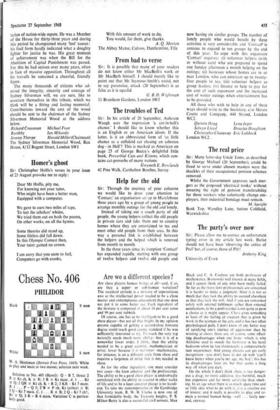Chess No. 406
PHILIDOR
9 men 8 men
W. A. Shinkman (Detroit Free Press, 1885). White to play and mate in two moves; solution next week.
Solution to No. A05 (Havel): Q - B 7, threat 2 R x Kt ch, K x R; 3 R x Kt mate. A. 1 . . . Kt x Q; 2 QR x Kt ch, K - R 2; 3 KR - Kt 7 mate. B. I . . p - Q 5; T.B X P ch, Kt (either) X B; 3 Q - Kt 7 mate. C. 1 . . .R x B; 2 Q - Kt 7 eh!, Kt x Q; 3 R - R 6 mate. Variation C is particu- larly good.
Are we a different species?
Are chess players human beings at all—and, if so, are they a super-' or sub-human variation/ The standard attitude is a mixture of superstitious awe at the intellectual power needed to be a chess master and contemptuous amazement that one does not put it to some better use. Each ingredient of the mixture is composed of about 10 per cent sense and 90 per cent rubbish.
Of course, one has to be intelligent to be a good chess player—but not all that bright. In my opinion anyone capable of getting a second-class honours degree could reach good county standard if he was sufficiently interested to try. To reach the very top naturally needs much more ability—but it is of a somewhat lower order, 1 think, than the ability needed to be a great scientist, mathematician or artist; lower because it is narrower—mathematics, for instance, is on a different scale from chess and requires a largeness of mind that is not needed in chess.
As for the other ingredient, one must consider two cases—the keen amateur and the professional, The ability to be a good chess player ilundoubtedly correlated with the ability to succeed in other walks of life and to be a keen amateur player is no handi- cap. To take my contemporaries in th.,ambridge University team, R. W. B. Clarke is now one of that formidable body, the Treasury knights, P. S. Milner-Barry is also a successful civil servant, Max
Black and C. A. Coulson are both professors of mathematics, Bronowski well known in many -fields!, and I cannot think of any who have really failed. So far as the (very few) professionals are concerned it is harder to make a judgment. Here it is not so much that they lack the ability to succeed elsewhere as that they lack the will. And if you are concerned solely with internal fulfilment rather than external satisfactions, to be a professional is not quite as poor a choice as it might appear. Chess gives something at least of the feeling of creation that is given by work in the sciences or the arts, and it has two other psychological pulls. I don't know of any better way of satisfying one's instinct of aggression than by winning at chess; there are, of course, some offset- ting disadvantages when one loses—which is why Alekhine used to smash the furniture in his hotel bedroom when he lost (fortunately a comparatively rare occurrence). And young players can get early recognition—you don't have to put up with 'you'll know better when you're my age. my boy'; this has its disadvantages later on, but that seems a. long way off when you start.
On the whole I don't think chess is too danger- ous a drug; no more addictive. less harmful, much less expensive and far more satisfying than smok- ing. In an age when there is so much spare time and so little idea what to do with it, it is a creative use of leisure; and it really is possible to play and re- main a normal human being—well . . . fairly nor- mal, anyway.










































 Previous page
Previous page